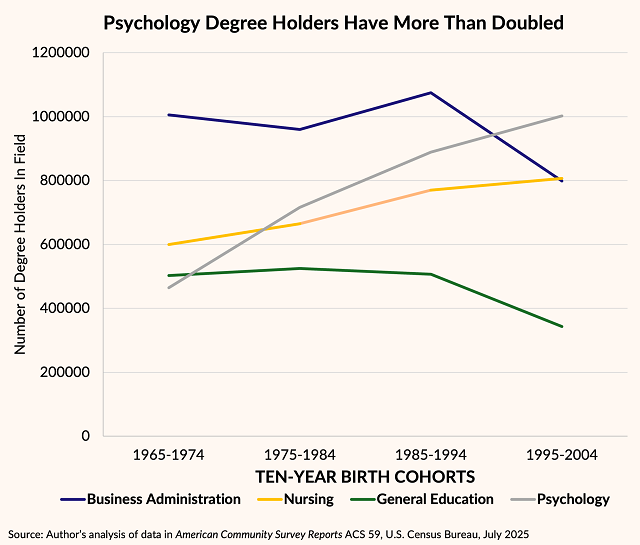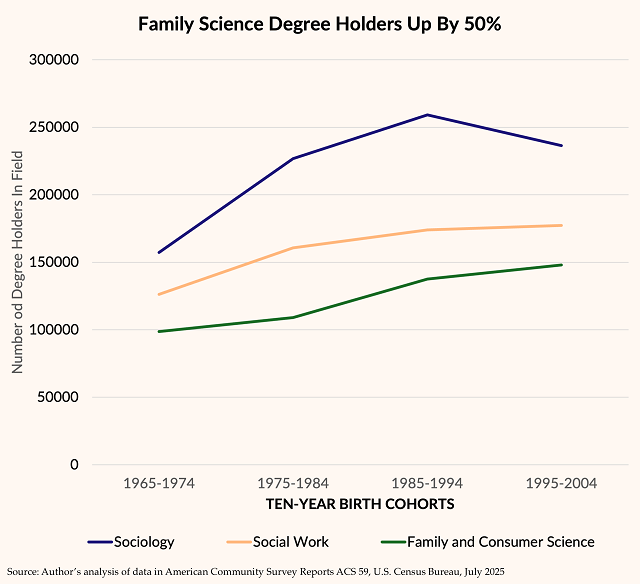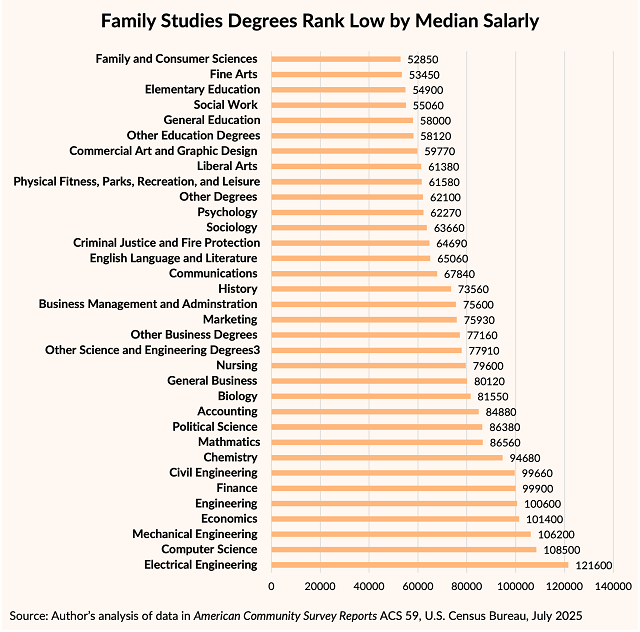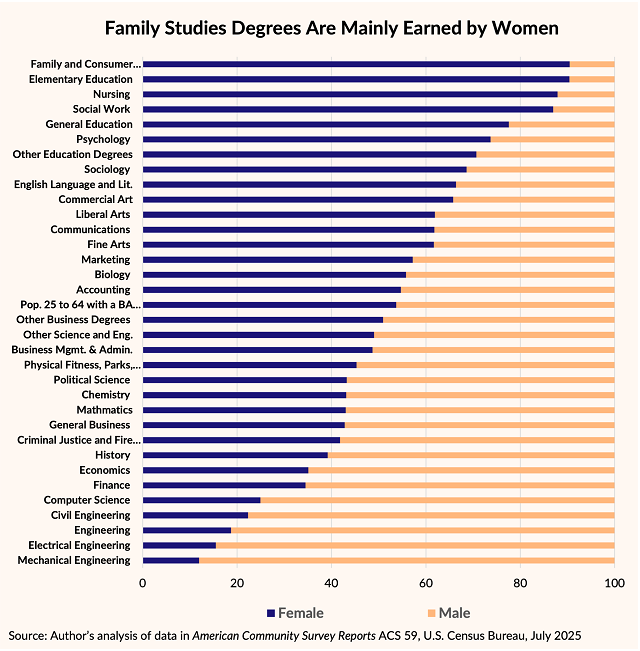Highlights
- A majority of adults who have attained college degrees in family-studies-related fields are women. Post This
- The number of psychology majors has risen from 464,000 among older adults to more than one million among younger adults, per the Census Bureau. Post This
- When college-degree fields are ranked from lowest to highest as measured by the average earnings of adults holding each kind of first degree, family studies-related fields come in among the least lucrative pursuits. Post This
The Census Bureau released a report this past summer on the fields college graduates are choosing for a major and how that has changed over the years (specifically, for graduates born in the late sixties to seventies and those born in the late nineties to early 2000’s). One of the striking findings is an upsurge in the number of graduates whose first majors are in fields that involve studies of the human family. These include majors such as family and consumer sciences, social work, psychology, and sociology. In fact, the number of psychology majors more than doubled, rising from 464,000 among older adults (those who are now ages 55 to 64) to more than one million among younger adults (those ages 25 to 34).
By comparison, another major that has grown in popularity—nursing—rose more modestly, from 600,000 among adults born in 1965-1974 to 800,000 among those born in 1995-2004. And majors that were more popular than psychology in the past, like business management and administration and general education, have declined to the point where they are less popular than psychology among younger cohorts.

While the numbers are not as large, college graduates majoring in sociology, social work, and family and consumer sciences have also increased substantially. Sociology majors have increased by 50%, from 157,000 among adults born in 1965-1974 to 236,000 among those born in 1995-2004. Social work majors are up 40%, from 126,000 to 177,000 over the same age groups. And family and consumer science majors have grown by 50%, from 99,000 to 148,000.

Not a Matter of Money
What is driving the cross-generational surge in family-studies majors? It’s not money. Adults with first majors in sociology had an average (median) salary of $63,660 in 2022, while those majoring in psychology earned an average of $62,270.1 Average earnings of adults who majored in social work ($55,060 ) or family and consumer science ($52,850) were lower still.
Those salaries were all well below the average for adults with first degrees in business management and administration ($75,600) or nursing ($79,600), not to mention biology ($81,550), engineering ($100,600) or computer science ($108,500).
Indeed, when college-degree fields are ranked from lowest to highest as measured by the average earnings of adults holding each kind of first degree, family studies-related fields come in among the least lucrative pursuits, with salaries not far from those for graduates in fine arts ($53,450), elementary education ($54,900) or physical fitness, parks, recreation, and leisure ($61,580).

Most Family Science Degree Holders Are Women
A majority of adults who have attained college degrees in family-studies-related fields are women: 91% of first degree holders in family and consumer sciences are females, as are 87% of those holding social work degrees, 74% of those with psychology degrees, and 69% of those with sociology degrees (see figure below)
This is part of the reason for the upsurge in the number of such degree holders and for the relatively low salaries that these degree holders earn. The number of females earning college, graduate, and professional degrees in all fields has been increasing in recent decades. Median salaries are lower in fields in which women predominate, with the exception of nursing and biology, where employment as health care practitioners brings higher remuneration.2 Even in fields where women predominate, male degree holders still earn more, on average.3
Despite efforts to expand employment opportunities for women and make female job preferences more like those of males, today’s young women continue to be drawn to careers in the social and life sciences rather than the physical and computer sciences and engineering. Growing numbers of women aim to work in the more basic sciences, to be sure. But they are still greatly outnumbered by men, and by women who strive to work in education, health, mental health, and social science fields.
Another reason why family studies majors have relatively low earnings is that most college degree holders in family-studies related fields stop their education after earning the bachelor’s degree. This is true of 68% of graduates with first degrees in family and consumer sciences, 61% of graduates in sociology, and 51% of psychology graduates. Social work degree holders are an exception, but just barely: 49% of them hold a bachelor’s degree only.
By contrast, 61% of first degree holders in biology also hold master’s, doctorate, or professional degrees, as do 64% of first-degree holders in chemistry.

Family Studies Majors Employed in a Variety of Occupations
One of the attractions of family studies majors is that they allow the holders to work in a variety of fields after graduation, as do degrees in English and other liberal arts. The most frequent occupation group in which family-studies degree holders are employed is a Census category that encompasses education, legal, community service, arts and media occupations.4 It is not a majority of family studies graduates who are employed in this grab-bag category, but rather a large minority: 49% of social-work degree holders; 38% of family and consumer sciences graduates; and 30% of graduates in sociology and psychology. Smaller fractions of family-studies graduates are employed in other occupations such as computer, engineering, and science occupations or health care and technical work. These graduates are more likely to have earned graduate or professional degrees and to have higher earnings.5
A Changing Social Landscape
The upsurge in family studies-related degrees may well be a response to the dramatic changes that have occurred in family life, identity politics, education, and youth mental health since the 1960’s. These changes include:
- The growing number of dual-career families, ones in which both parents are employed outside the home and must find ways to balance work and family obligations.
- Increases in single-parent and step-parent families.
- Challenges to traditional parental roles and career restrictions for women.
- The push for alternative family structures.
- Increases in the number of students who are diagnosed with ADHD, autism, depression, and anxiety, and who are prescribed medications from early ages as part of their schooling experience.
Choosing to major in family studies may be a way for college students to come to terms with the changing social landscape in which they have grown up. It may also reflect what students see as employment opportunities to either be part of, or help to resist, the organizations and institutions driving these changes.
Nicholas Zill is a research psychologist and senior fellow of the Institute for Family Studies. He directed the National Survey of Children, a longitudinal study that produced widely cited findings on children’s life experiences and adjustment following parental divorce.
1. The median salary figures are for adults of ages 25 through 64.
2. In the top 13 degree fields for men, first degree holders (both male and female) earned an average of $96,620 (median value). In the top 13 degree fields for women, first degree holders (both female and male) earned an average of $64,130, or about one-third less.
3. In the top 13 degree fields for men, women with first degrees in those fields earned an average of 77% of what men with first degrees in the same fields earned (median value). In the top 13 degree fields for women, women earned an average of 79% of what men earned who had degrees in the same fields.
4. American Community Survey Reports, ACS 59, Tables 6 and 7.
5. Ibid.













